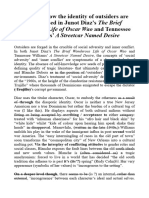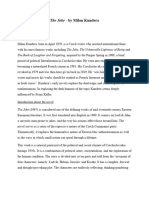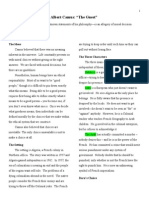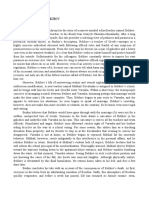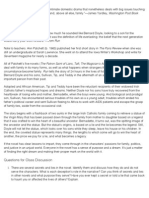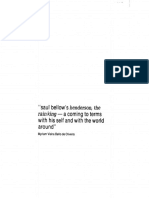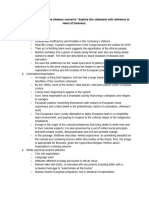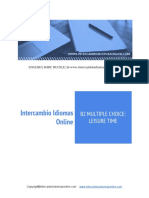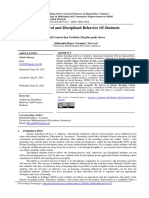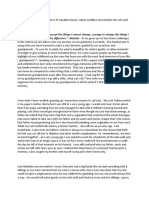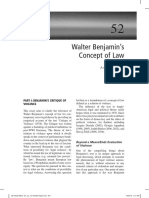Chapter 6: The Consul Brande is writing a philosophical essay on the French philosopher
Malbranche. His son Nicholas, who spends his time with the gardener José, is neglected by
him since he is preoccupied with his project. Envious of their camaraderie, Brande attempts
to keep them apart. Additionally, he intends to fire José since he believes the latter stole his
antique weaponry.
Chapter 7: The more secrets and stories Nicholas and José exchange, the closer they get.
José tells Nicholas about his love for the mountains and his sisters, and Nicholas tells José
about his mother, who abandoned him when he was a kid. They explore the garden and play
activities as well. Meanwhile, Brande feels isolated from his son and is unhappy with his lack
of progress on his book. In an attempt to impress them with his knowledge and his house, he
extends an invitation for tea to the Burtons, his assistant and wife. However, the visit ends
badly since Nicholas flees to be with José and the Burtons become disinterested in Brande's
talk.
Chapter 8: José is confronted by Brande, who claims that he stole his firearms. José says he
has an alibi and disputes the charge when the guardia civil calls to have him arrested. He says
that when the theft occurred, he and Nicholas witnessed a stranger hiding in the garden.
Nicholas attests to José's account, but Brande does not accept it and believes Nicholas is
telling lies to keep José safe. When he gives the guardia the order to remove José, Nicholas is
devastated.
Chapter 9: With José's arrest, Nicholas becomes unwell. In addition to having nightmares
and a fever, he is mute and won't eat. Concerned, Brande asks renowned Parisian physician
Professor Halevy to examine him. When Halevy arrives, he determines that Nicholas has a
nerve condition brought on by emotional stress. He counsels Brande to let his son to meet
José once more and to show him more love and attention. Despite her reluctance, Brande
decides to try. Since he has no proof against José, he also chooses to withdraw the charge
against him.
The characters in Cronin A. J.'s The Spanish Gardener are debating freedom and
responsibility in chapters 6–9. They experience uneasiness and bewilderment as a result of
having to balance their own independence with the duty of making decisions in the absence
of clear instructions or predefined routes. The Consul Brande is engrossed in his reading and
ignores his son Nicholas, who is hanging out with the gardener José. Envious of their
camaraderie, Brande attempts to keep them apart. Additionally, he intends to fire José since
he believes the latter stole his antique weaponry. The more secrets and stories Nicholas and
José exchange, the closer they get.
José tells Nicholas about his love for the mountains and his sisters, and Nicholas tells José
about his mother, who abandoned him when he was a kid. They explore the garden and play
activities as well. Meanwhile, Brande feels isolated from his son and is unhappy with his lack
of progress on his book. In an attempt to impress them with his knowledge and his house, he
extends an invitation for tea to the Burtons, his assistant and wife. However, the visit ends
badly since Nicholas flees to be with José and the Burtons become disinterested in Brande's
talk. José is confronted by Brande, who claims that he stole his firearms. José says he has an
alibi and disputes the charge when the guardia civil calls to have him arrested. He says that
when the theft occurred, he and Nicholas witnessed a stranger hiding in the garden.
�Nicholas attests to José's account, but Brande does not accept it and believes Nicholas is
telling lies to keep José safe. Heartbroken, Nicholas tells the guardia to take José away. With
José's arrest, Nicholas becomes unwell. In addition to having nightmares and a fever, he is
mute and won't eat. Concerned, Brande asks renowned Parisian physician Professor Halevy
to examine him.
When Halevy arrives, he determines that Nicholas has a nerve condition brought on by
emotional stress. He counsels Brande to let his son to meet José once more and to show him
more love and attention. Despite her reluctance, Brande decides to try. Since he has no proof
against José, he also chooses to withdraw the charge against him. Characters attempting to
create their own values, ideas, and identities apart from outside influences were frequently
driven by the crisis to reflect on themselves and pursue authenticity.
“When Sunday came the Consul decided that he would receive the Burtons out of doors and
give them tea in the garden. The afternoon was fine and warm; moreover, since twilight still
fell early, his guests would thus have less opportunity to settle down and overstay their
welcome.” The Consul's decision to receive the Burtons in the garden reflects his desire to
control the situation and avoid any unpredictable choices they might make. By hosting
outdoors, he restricts the guests' movement and confines the interaction to his curated space.
This physical limitation mirrors his desire to control the conversation and prevent any
unwelcome surprises.
The Consul's dread of being free is reflected in his desire to have control over the
circumstances. He worries about becoming vulnerable to the unknown and about losing
control.
The Burtons' freedom is being restricted by the Consul's choice to host them outside. He
wants to make sure people respect his authority and don't stray from his comfort zone.
“Alvin sighed as the Consul concluded an account of the coronation of King Albert. “We’d
have given anything to be present at such a colorful ceremony. Wouldn’t we, Carol?”
Alvin's lament for a more varied and thrilling life than their ostensibly boring life in San
Jorge is evident in his sigh as the Consul talks about the coronation. Unlike the well-traveled
Consul, the Burtons have never been privy to such magnificent occasions. Alvin's sigh
conveys his wish for an exciting, adventurous, and more rewarding life.
Alvin's desire for freedom is reflected in his longing for a more expansive life. He aspires to
have a more fulfilled life and to encounter new things.
Alvin's sigh implies that he doesn't feel like he can design his own adventures. Both his
environment and his own lack of agency constrain him.
“Carol Burton looked at him directly. Was it possible, he asked himself, that despite the
amiable blankness of her expression she surmised the deeper intention of his remark?… She
answered quickly: “We have lots of friends, sir, I assure you. We go sailing often in the bay
with Miguel, the Alcade’s son. In the evenings we sometimes drop in at the Teatro… and
afterwards we have supper at the Chantaco.””
�Carol's reply to the Consul's statement highlights her different outlook on life. Carol looks the
Consul in the eye and challenges his veiled condescension, unlike Alvin's sighing acceptance.
This demonstrates her self-assurance and resistance to manipulation or condescension.
Her in-depth description of their San Jorge adventures shows a happy existence full of real
connections and straightforward joys. She enjoys movies, sailing, and get-togethers with the
community—things the Consul probably considers unimportant. Carol actively shapes her
experiences rather than just existing. Beyond the Consul's narrow-minded viewpoint, she
makes friends with the people, participates in leisure activities, and builds a meaningful
existence for herself and Alvin.
Carol's willingness to accept responsibility for her own happiness is shown in her active
participation in life. She doesn't hesitate to take chances or make decisions.
Compared to the Consul's nervousness and Alvin's confusion, Carol's assurance and
directness imply an inner clarity and freedom.
All things considered, these quotations show how the characters struggle with the burden of
individual autonomy and the obligation to make decisions in a society devoid of norms.
Different reactions to this internal struggle are represented by the Consul's control, Alvin's
desire, and Carol's involvement, which cause differing levels of uneasiness and confusion.

